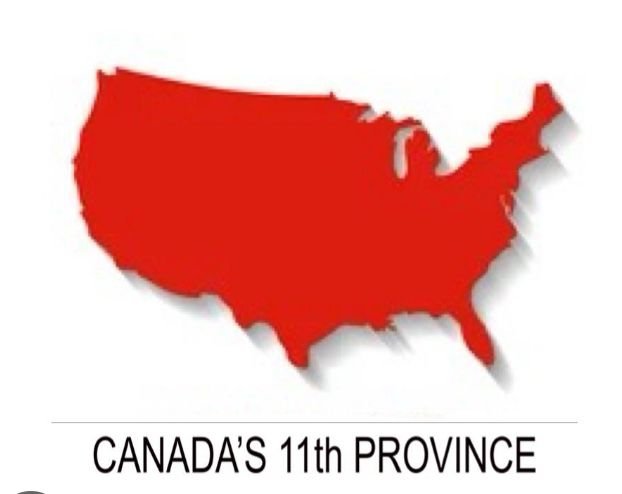USA to Become the 11th Province of Canada: What This Means for North America

In a stunning announcement that has sent shockwaves through both Canadian and American political circles, the United States is set to become the 11th province of Canada. This unexpected decision marks a pivotal moment in North American history, one that will reshape the continent’s future in ways that are hard to predict. While the announcement might seem like an improbable scenario at first, the move could have significant ramifications for the economies, politics, and cultural dynamics of both nations. Here’s a closer look at what this historic change could mean.
The Idea Behind the Move
The concept of the United States joining Canada as a province has long been a subject of political speculation and debate, but it has never been seriously pursued until now. Several factors appear to have contributed to the possibility of this union, including growing political divisions within the U.S., a desire for greater economic stability, and a general sense of dissatisfaction with the current direction of American politics.
On the Canadian side, the proposal has received strong support from both the federal government and the majority of provincial leaders. Advocates argue that the inclusion of the United States as a Canadian province would strengthen the country’s economic and military position while creating new opportunities for trade, innovation, and geopolitical influence.
Political Ramifications
One of the most significant aspects of the proposed merger is the political ramifications it will have for both nations. For the U.S., joining Canada as a province would mean a complete restructuring of its political system. No longer a sovereign state, the U.S. would transition into a provincial government with representation in the Canadian Parliament, a drastic departure from the current framework of federalism that has defined American governance for over two centuries.
This shift would likely result in a profound change in how U.S. citizens relate to their government. Rather than electing a president, voters in the former U.S. would choose provincial representatives and work within the parliamentary system to influence policy decisions. It’s unclear how this transition would affect the cultural identity of Americans, who have long identified as citizens of a powerful, independent nation.
On the Canadian side, the move would also require significant adjustments. Canada’s parliamentary system would have to accommodate millions of new citizens, and issues like federalism, taxation, and healthcare would need to be reexamined. Canada’s political parties would likely experience shifts in leadership and policy priorities, as U.S. interests and values are brought into the fold.
Economic Benefits and Challenges
The economic implications of this union cannot be overstated. With the U.S. joining Canada, the two nations would form one of the largest and most influential economic blocs in the world. By merging the massive consumer market of the United States with Canada’s wealth of natural resources and advanced industries, the combined entity could have a tremendous global economic presence.
Trade relationships between Canada and the U.S. would no longer require complicated international agreements or cross-border negotiations. Instead, goods and services could flow seamlessly between provinces, boosting productivity and creating a more robust economic ecosystem. Additionally, the vast resources of the U.S. could complement Canada’s energy sector, technology innovations, and manufacturing base, paving the way for new economic ventures.
However, this new union would also present significant challenges. The integration of such large and diverse economies would require careful coordination to prevent job losses, economic disparities, and regional tensions. Additionally, there are concerns about the economic gap between wealthier U.S. states and poorer Canadian provinces, which may lead to disparities in public services and taxation policies.
Cultural Considerations
Culturally, the idea of the U.S. joining Canada is a topic of considerable debate. Both countries share a long history of cooperation and cultural exchange, but there are also notable differences in values, traditions, and social norms. The U.S. is a much larger and more diverse nation, with a complex history of racial, ethnic, and social divisions. Canada’s cultural identity, on the other hand, is more closely tied to its bilingual heritage, Indigenous communities, and commitment to multiculturalism.
Integrating these two distinct cultural landscapes will undoubtedly be a delicate process. Education systems, social services, and national celebrations would need to be harmonized, ensuring that the diverse populations of both nations can coexist in a unified society. The challenge of reconciling differences in social policies, such as healthcare and gun control, will also be a major point of contention.
Geopolitical Impact
On the global stage, the merger would shift the balance of power. The newly formed entity would possess one of the largest and most advanced military forces, along with significant geopolitical influence. This shift could lead to new alliances and challenges in global politics, as countries adjust to the presence of a united North American power. The potential for a more unified approach to international diplomacy, defense, and trade could lead to greater stability, but it could also provoke tension with other world powers.
Conclusion
The idea of the United States joining Canada as the 11th province may seem surreal, but it raises fascinating questions about the future of North America. Whether this union will become a reality remains to be seen, but the potential benefits and challenges are undeniable. As political leaders on both sides of the border grapple with the ramifications, one thing is certain: this historic shift would mark a new chapter in the history of both countries and the continent as a whole.
